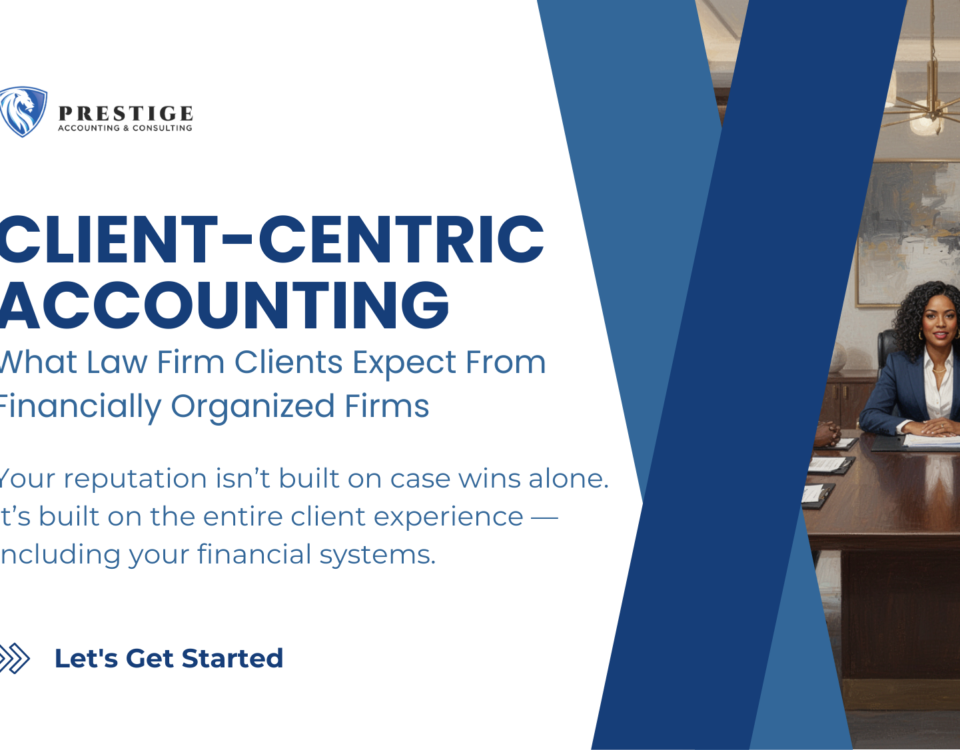
Law Firm Owner Pay: How to Structure It for Profit and Taxes
August 28, 2025
What to Automate in Your Law Firm’s Back Office (and What Not To)
September 4, 2025
Categories
How to Build a Financial System That Doesn’t Break as You Grow
Why Your Law Firm Needs Infrastructure—Not Improvisation
There comes a point in every growing law firm when the DIY approach starts to fall apart.
Maybe it’s when you hire your second team member. Or when you hit $500K in revenue. Or when you miss a tax deadline because you couldn’t find the right report. But every lawyer who scales reaches a point where it becomes clear:
Your financial systems are either supporting your growth—or silently sabotaging it.
And more often than not, they’re duct-taped together with spreadsheets, guesswork, and outdated QuickBooks categories.
If your law firm is growing, but your back office is still operating like it did when you were solo, this blog will walk you through what a real financial syste|m looks like—and why you can’t afford to wait to build it.
Growth Doesn’t Break Law Firms—Broken Systems Do
Many attorneys believe they have a “growth problem”—too many cases, too much client volume, too little time. But in reality, they have a systems problem.
When you scale without structure, issues that were manageable at a small size start to cascade:
- Invoices go unpaid because no one’s following up
- Trust account compliance slips through the cracks
- Payroll is rushed—or wrong
- You don’t know how much you can safely draw
- You can’t track profitability by case or team member
- Marketing spend increases, but no one’s measuring ROI
What worked when it was just you and a paralegal no longer holds up at scale. And trying to “muscle through” only compounds the risk.
What a Scalable Financial System Really Means
A scalable financial system is not just bookkeeping. It’s not just QuickBooks. It’s a cohesive structure that connects your firm’s operations, finances, and strategy into one coordinated engine.
At its core, it includes:
- Real-time financial visibility (so you’re not making decisions in the dark)
- Defined processes for billing, payroll, taxes, and reporting
- Role clarity (so tasks don’t live in your head—or fall through the cracks)
- Compliance-ready trust accounting for every jurisdiction you serve
- Automated routines that reduce manual work and human error
You need a system that doesn’t just track the business—it helps you run it.
The Road to Scalability Starts with Awareness
Most firms don’t build systems because they’re too busy managing cases. But the longer you delay, the harder it is to clean up.
Early warning signs you’re outgrowing your current setup include:
- Scrambling for financial reports only at tax time
- Using Venmo, Zelle, or paper checks with no oversight
- Delegating trust account management to untrained staff
- Avoiding dashboards because the data feels unreliable
- Hiring people without knowing your monthly cash flow
- Feeling unsure how much you’ve actually earned—even after a “good month”
At this point, your firm doesn’t need more effort—it needs a repeatable infrastructure.
Why Plugging Tools Together Isn’t the Same as Building a System
It’s tempting to think, “We have software for that,” and assume that using LawPay, QuickBooks, and Clio means you have a system.
But software without process is like having a filing cabinet with no folders: everything exists, but nothing’s where it should be.
A system means:
- Your tools are talking to each other
- Every transaction is captured, categorized, and reconciled
- Your team knows who owns what task (and how to execute it)
- You’re able to pull a P&L, trust ledger, or payroll report anytime—without panic
Software is the tool.
System design is the strategy.
Building Your Firm’s Financial Infrastructure—What It Involves
This is where most firms need help—not with bookkeeping, but with the architecture that supports sustainable growth.
It includes:
- Choosing the right chart of accounts that reflects legal industry nuances
- Setting up recurring billing processes and payment terms
- Creating workflows for time tracking, invoice review, and payment collection
- Integrating trust accounting into your general ledger without risking compliance
- Assigning accountability across staff roles
- Reviewing KPIs monthly—not just at year-end
The goal isn’t to make your business more complicated. It’s to make it more clear. So you can scale without constantly cleaning up after yourself.
When You Don’t Build It, You Pay for It Anyway
Here’s the real cost of avoiding systems:
- Thousands in unbilled or uncollected revenue
- Missed tax deadlines and underestimated liabilities
- Burnout from carrying financial responsibility alone
- Clients lost due to admin delays or confusion
- Staff turnover because no one knows what they’re supposed to do
- A firm that looks successful but feels unstable
Every month you delay, your business becomes more fragile. And the clean-up cost only grows.
What We Do at Prestige Accounting and Consulting
We don’t just fix books—we help you build infrastructure.
Our law firm clients get:
- A customized financial system mapped to their specific practice and growth goals
- Integrated tools with clean, reliable data
- Clear SOPs for billing, payroll, trust account reconciliation, and reporting
- Regular check-ins to review performance and plan next steps
If your firm is growing but your backend still feels like guesswork, this is the time to fix it—not when the IRS, your bar association, or your team forces the issue.
📅 Book your consultation now and we’ll show you what building a real financial system for your firm actually looks like.




